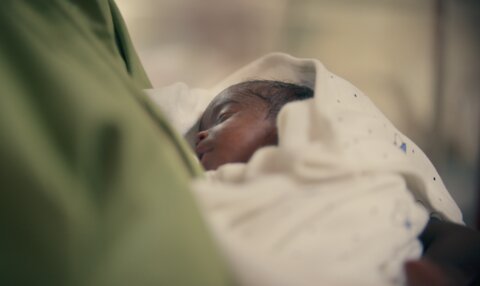Delivering better healthcare outcomes through PAMAfrica’s CALINA study

This April, Novartis and Medicines for Malaria Venture (MMV) announced positive data from the Phase 2/3 CALINA study conducted through PAMAfrica’s Work Package 2. The CALINA study was designed to evaluate the use of a novel formulation of Coartem®, known as Coartem < 5kg Baby, in the treatment of uncomplicated malaria in young infants < 5kg. The study demonstrated that the optimized dose of artemether-lumefantrine (AL) achieved the exposure levels of AL in young infants <5kg which are within the safe and efficacious range. Efficacy and safety with the optimized dose were comparable to that of the known profile of AL in patients >5kg.1
According to the World Health Organization’s World malaria report 2023, 76% of global malaria deaths in 2022 were in children under 5, with the vast majority occurring in Africa. Moreover, to this point there has been no malaria treatment tailored to babies under 5 kg. These children, when diagnosed with malaria, are often treated with a fraction of a dose intended for older children. However, due to the immaturity of metabolism in these patients, artemether concentrations are much higher than for the equivalent dose in older children and there are concerns that high concentrations of artemether may be associated with neurotoxicity. Hence, a novel formulation of Coartem was developed to address the need for lower doses of AL in small infants, matching the exposure to those demonstrated to be safe and effective in older patients.
One of the PAMAfrica consortium goals has been to fill this gap through its WP 2, which has now successfully conducted the first evidence-based trial to evaluate a new antimalarial dose and regimen for all infants weighing under 5 kg with acute uncomplicated malaria. If approved, Coartem < 5 kg Baby can have an immediate impact on how the smallest babies with malaria are treated, delivering better health outcomes for them. Achieving the malaria elimination agenda requires that all patients have access to appropriate treatments so expanding the antimalarial toolbox to include a critical neglected group represents a big step forward.
"Ensuring the smallest babies suffering from malaria get the right dose of medicine has long been a challenge for doctors on the African continent,” says Dr Bérenger Kaboré, Research Associate at the Clinical Research Unit of Nanoro (Burkina Faso), a Principal Investigator of the CALINA study. “Through our collaboration, we're ensuring that every child receives a treatment which is specifically tailored to their needs and which will result in the best long-term prognosis."
The progress of the CALINA study reinforces the overarching goal of the PAMAfrica consortium to develop the next generation of malaria treatments to save lives, reduce the burden of malaria and contribute to improved global health security. It also reflects the gains we can make through global R&D collaborations: “The CALINA trial is a brilliant example of ‘Reimagining Medicine’, one of the key aims of our partner, Novartis. The collaborations between Africa and Europe to facilitate such a trial in newborn babies represent a major advance in medicine. Beyond that, the team used state-of-the-art analyses to make the case for the risk-benefit and efficacy of this new medicine. A truly terrific demonstration of teamwork, leading to a new product in this neglected population,” says Tim Wells, coordinator of the PAMAfrica programme.
For more information, read the MMV/Novartis press release and The Guardian article highlighting PAMAfrica’s WP2 trials, published last December.